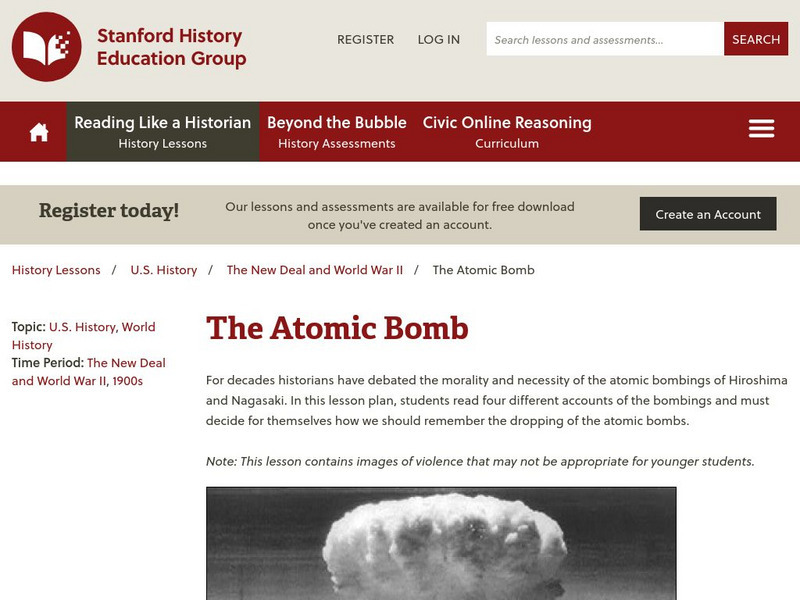Curated OER
Fallout
Students view a short film about the results of dropping the atomic bomb at the end of World War II. They research controversies surrounding the use of the bomb and nuclear weapons. They write two editorials about the issue.
Curated OER
United States - Japanese Relations In Post World War II Era
Ninth graders explore the relationship between the United States and Japan. In groups, classmates research the treatment of Koreans and Americans as prisoners of war. Pupils examine the effect of politics and agreements during the war....
Curated OER
Sadako: A Tribute to a Girl with Cancer
Pupils explore the story of Sadako, a young girl, who had leukemia as a result of a bomb being dropped on Hiroshima in 1955. They create a chain of paper cranes and design a fund-raising event. They write poems in the Japanese style of...
Curated OER
Dancing in the Desert: The Genie
Fifth graders study nuclear destruction using visual literacy. In this nuclear destruction lesson plan, 5th graders work in groups to examine a group of pictures that show the destruction of a home by a nuclear blast. They discuss the...
Smithsonian Institution
Cuban Missile Crisis
The United States—specifically John F. Kennedy—played a large role during the Cuban Missile Crisis. A history resource poses questions that encourage critical thinking as well as in-depth analysis of images from the time period.
Curated OER
Structured Academic Controversy (SAC) in the History Classroom
SAC is a specific approach to discussing history and controversial issues. Rather than adhering to an either/or debate-style paradigm, it fosters speaking and constructivist listening to enable learners to build consensus through...
Curated OER
The Tell-Tale Plume
Young scholars examine hydrothermal vents. For this ocean lesson, students identify changes in physical and chemical properties of sea water caused by hydrothermal vents.
Curated OER
GRAVE OF THE FIREFLIES
Learners engage in a video activity to research the effects of war upon the Japanese to live in the world after World War II. They answer specific questions in order to complete the unit.
Curated OER
Sadako and the Thousand Paper Cranes
Third graders explore their culture in comparison to Japanese culture by reading the book, Sadako and the Thousand Paper Cranes. They identify islands of Japan, create a Venn diagram comparing Japanese culture to American culture, and...
Curated OER
Multimedia Lesson on Japan and Paper Cranes
Students explore paper cranes. In this Japan and paper cranes lesson, students discuss Japanese culture and history prior to creating their own paper cranes.
Curated OER
The Chemosynthetic Cafe
Learners study photosynthesis and chemosynthesis. In this chemosynthetic lesson students explain the processes of these and define terms.
Curated OER
A Hydrothermal Adventure
Students analyze hydrothermal vents. For this hydrothermal vents lesson, students discover the effects of hydrothermal vents on tectonic plates. Students make model hydrothermal vents to understand how they form and operate.
Curated OER
Events of World War II
Ninth graders examine the main leaders and events of World War II. In small groups they analyze images of main events in WWII, listen to a lecture, and complete a fill-in-the-blank worksheet.
Curated OER
Takejiro Higa - Military Intelligence Service
Eleventh graders study the contribution of Takejiro Higa in the invasion of Okinawa.
Curated OER
WAR child Canada's: GENOCIDE
Students identify reasons genocide occurs through group research into specific Genocide incidents of the 20th century. They put into perspective why an organization such as the United Nations is necessary by introducing them to one of...
Curated OER
GAURI AND PRITHVI: THE SUB-CONTINENT GOES NUCLEAR
Students write short papers on the background of the Pakistani missile called Gauri, named for one of the first Afghan military invaders of India in 11th century, Prithvi is named for Hindu general who fought Muslim invaders, Agni (Hindu...
Stanford University
Sheg: Document Based History: Reading Like a Historian: The Atomic Bomb
[Free Registration/Login Required] How necessary was it for the United States to drop the atomic bombs on Nagasaki and Hiroshima in World War II? In this lesson, young scholars will study varying accounts and develop their own opinions...
Alabama Learning Exchange
Alex: The Bombing of Hiroshima Fact or Opinion
Eleventh graders will read "A Noiseless Flash" from Hiroshima, written by John Hersey with a partner and record facts (objective reporting) and opinions (subjective reporting) as given in the reading selection.
Ohio State University
Osu History Teaching Institute: The Manhattan Project
Students will discuss the role of technology of the atomic bomb and explore the destruction of Nagasaki and Hiroshima during WWII. Students will then outline some of the social and political changes that resulted from the Manhattan Project.
American Forum for Global Education
American Forum for Global Education: Hiroshima Through Japanese Eyes
This lesson plan lets pupils research about the atomic bombing of Hiroshima from the viewpoint from a Japanese girl, Sadako.
Science Education Resource Center at Carleton College
Serc: Bot Ec: Energy Released in an Earthquake
A magnitude 8.5 earthquake (such as the 1964 Good Friday earthquake in Alaska) releases about 1x1018 joules of energy. The atomic bomb exploded over Hiroshima released about 1.5x1013 joules of energy. How many Hiroshima bombs would one...



















